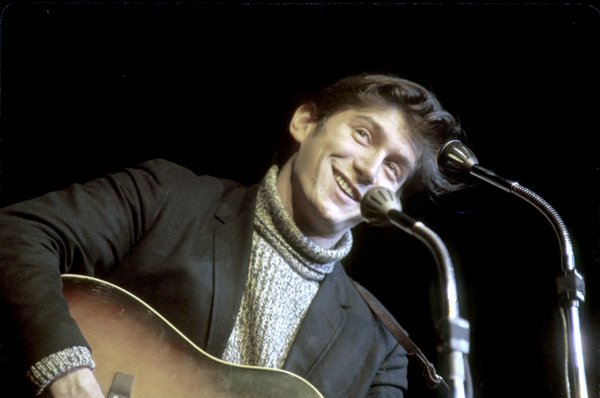|
Reviews of Recent Independent, Foreign, & Documentary Films in Theaters and DVD/Home Video

PHIL OCHS: THERE BUT FOR FORTUNE This biography covers the familiar and the less known in the life and times of the political troubadour of the 1960’s and 1970’s. Phil Ochs’s youth in Middle America and (surprise) a military academy is recalled by family and his college roommate, who first introduced him to post-war folk music and the power of the guitar. His arrival into the Greenwich Village folk music renaissance repeats many of the scenes seen recently in documentaries on Pete Seeger, Joan Baez, and Wavy Gravy, supplemented with extended reflections by his mentor, the too-often neglected folk pioneer Judy Henske. Bob Dylan looms large here, as in all these films, and throughout Ochs’s career as an inspiration and competitor. Ochs writes as prolifically and sings more beautifully, but Dylan’s type of stardom eludes him. He even shared the similar experience of rejection from the narrow acoustic community as Dylan when folkies scorned Ochs’s later albums that were recorded with piano and orchestra and performed in Elvis-like gold lamé glamour. Their reconciliation singing together at a 1973 benefit concert Ochs organized for Allende supporters in Chile is one of the film’s moving highlights. Director Kenneth Bowser, who has made several American Masters documentaries on filmmakers, accomplishes the difficult task of appealing both to nostalgic fans of Ochs and younger students of this period of history. Like Judith Ehrlich and Rick Goldsmith’s recent The Most Dangerous Man in America: Daniel Ellsberg and the Pentagon Papers, this documentary provides a lot of contextual history that will be repetitive to older viewers, particularly with the inclusion of so many over-used images of J.F.K., L.B.J., the Vietnam War, and the many protests. Bowser manages to avoid a my-eyes-glaze-over effect by frequently splitting the screen, either to replicate the culture wars raging at the time, or in then-and-now contrasting images of the many interviewees, like Tom Hayden. This specific background is particularly important because Ochs prided himself on being a topical songwriter who carried around a sheaf of news articles to inspire his angry lyrics and passionate voice. While his songs intentionally followed in the tradition of Woody Guthrie in referring to specific examples of injustice (striking miners in “Hazard, Kentucky”) or tragedy (the notorious Kitty Genovese murder in the biting ragtime of “Outside of a Small Circle of Friends”), the film expands into how he saw music as one element within political theater. The tradition of the “Living Newspapers” of the Depression-era WPA’s Federal Theatre Project is not credited as a predecessor, nor how his staging of demonstrations were paralleled by John Lennon in his use of the media to give peace a chance. Phil’s family is honest in the interviews. The film’s co-producer, Michael Ochs, who had also managed his older brother’s later career, poignantly reveals the last years of Phil’s life, less known to fans, when he dangerously suffered from manic depression self-medicated with alcohol. That iconic first line of Howl (“I saw the best minds of my generation destroyed by madness”) comes to mind when Allan Ginsberg is seen joining with Ochs at various protests. Bowser movingly illustrates the Ochs family story with clips from John Huston’s long banned Let There Be Light (1945), about World War II veterans suffering from what’s now called posttraumatic stress disorder, to show the psychological legacy their veteran father brought home. This adds a poignant, personal background to songs, like his patriotic “Power and the Glory” and the anti-war anthem “I Ain’t Marching Anymore.” The memories of friends as varied as writers Lucian Truscott and Christopher Hitchens make this film a 360˚ perspective of Phil’s decline into suicide in 1976 at 35.
Unfortunately, none of Ochs’ songs is heard in their entirety without
interruption. So the continuing relevance of songs like
“What’s That I Hear” is given a mixed
emphasis, even as the hummable, beautiful melodies are constantly heard
in the background. Punk musician/Green Party
activist Jello Biafra laughs that only a few lyric changes are needed to
update “Love Me, I’m A Liberal” from its excoriation of Hubert H.
Humphrey and the Vietnam War to today’s politicians and wars. Too bad
Bowser doesn’t focus on the anti-military interventionism of
“Cops of the World” (one of my favorite Ochs’ songs), instead explaining
the now obscure references to Marines landing on the shores in
“Santo Domingo.” Maybe Sean
Penn’s comments were supposed to provide that appraisal, but don’t. It’s
finally Phil Ochs’s songs that make the viewer ache over the
hole left by the presciently sweet irony of his defiant lack of regrets
in “When I’m Gone.”
Nora Lee Mandel
|

